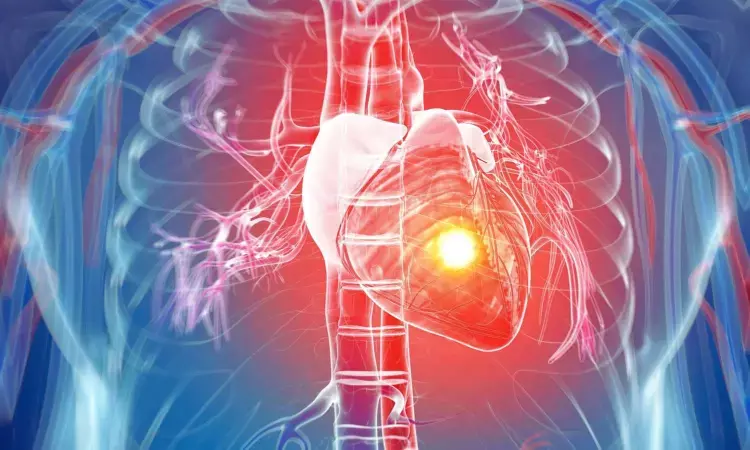- Home
- Medical news & Guidelines
- Anesthesiology
- Cardiology and CTVS
- Critical Care
- Dentistry
- Dermatology
- Diabetes and Endocrinology
- ENT
- Gastroenterology
- Medicine
- Nephrology
- Neurology
- Obstretics-Gynaecology
- Oncology
- Ophthalmology
- Orthopaedics
- Pediatrics-Neonatology
- Psychiatry
- Pulmonology
- Radiology
- Surgery
- Urology
- Laboratory Medicine
- Diet
- Nursing
- Paramedical
- Physiotherapy
- Health news
- Fact Check
- Bone Health Fact Check
- Brain Health Fact Check
- Cancer Related Fact Check
- Child Care Fact Check
- Dental and oral health fact check
- Diabetes and metabolic health fact check
- Diet and Nutrition Fact Check
- Eye and ENT Care Fact Check
- Fitness fact check
- Gut health fact check
- Heart health fact check
- Kidney health fact check
- Medical education fact check
- Men's health fact check
- Respiratory fact check
- Skin and hair care fact check
- Vaccine and Immunization fact check
- Women's health fact check
- AYUSH
- State News
- Andaman and Nicobar Islands
- Andhra Pradesh
- Arunachal Pradesh
- Assam
- Bihar
- Chandigarh
- Chattisgarh
- Dadra and Nagar Haveli
- Daman and Diu
- Delhi
- Goa
- Gujarat
- Haryana
- Himachal Pradesh
- Jammu & Kashmir
- Jharkhand
- Karnataka
- Kerala
- Ladakh
- Lakshadweep
- Madhya Pradesh
- Maharashtra
- Manipur
- Meghalaya
- Mizoram
- Nagaland
- Odisha
- Puducherry
- Punjab
- Rajasthan
- Sikkim
- Tamil Nadu
- Telangana
- Tripura
- Uttar Pradesh
- Uttrakhand
- West Bengal
- Medical Education
- Industry
Silent Heart Attacks Pose Long-Term Health Risks for Men Than Women: Study

A new study published in the European Journal of Preventive Cardiology found that unrecognized myocardial infarction (UMI), often called a "silent heart attack," carries significant long-term health risks, particularly for men. The study highlighted how undetected heart damage affects the risk of heart failure, stroke, and death differently in men and women.
This research examined data from 12,303 participants, with an average age of 64.8 years, more than half of whom were women. Using electrocardiograms (ECGs) and medical records collected between 1990 and 2008, the participants were categorized into Unrecognized MI (UMI, n=512), Recognized MI (RMI, n=669), and No MI (n=11,122). The study then tracked rates of heart failure (HF), atrial fibrillation (AF), stroke, and all-cause mortality over time.
Among women, silent heart attacks showed a modest link to higher risks of heart failure and death. Women with UMI had a 31% higher risk of heart failure and a 21% higher risk of dying from any cause when compared to the individuals without any heart attack history. However, these associations weakened once this study adjusted for common cardiovascular risk factors such as hypertension, cholesterol, and diabetes. Women with UMI also showed a trend toward a higher stroke risk, though this was not statistically significant.
Also, recognized heart attacks in women (RMI) were far more predictive of poor outcomes. These women faced more than double the risk of heart failure (HR 2.58) and a 62% higher risk of developing atrial fibrillation. Their risk of mortality was also significantly elevated (HR 1.81).
Both UMI and RMI were linked to substantially higher risks across nearly all outcomes. Men with silent heart attacks had nearly double the risk of heart failure (HR 1.90) and atrial fibrillation (HR 1.91), along with a twofold increase in stroke risk (HR 2.06). Mortality risk was also elevated (HR 1.59). Also, the differences between silent and recognized MIs were narrower in men, suggesting that even unnoticed heart damage can be as deadly as a diagnosed event.
Overall, these findings suggest the need for improved detection of silent heart attacks, especially among older men who may experience heart damage without typical warning symptoms. This study also highlight the important sex-based differences in cardiovascular vulnerability, which calls for more tailored prevention and monitoring strategies.
Reference:
van Oortmerssen, J. A. E., Zuo, L., Tilly, M. J., Hummel, B., Ikram, M. K., Boersma, E., Roeters van Lennep, J. E., & Kavousi, M. (2025). Long-term prognosis of unrecognized myocardial infarction in women and men from the general population: the Rotterdam Study. European Journal of Preventive Cardiology, zwaf689. https://doi.org/10.1093/eurjpc/zwaf689
Neuroscience Masters graduate
Jacinthlyn Sylvia, a Neuroscience Master's graduate from Chennai has worked extensively in deciphering the neurobiology of cognition and motor control in aging. She also has spread-out exposure to Neurosurgery from her Bachelor’s. She is currently involved in active Neuro-Oncology research. She is an upcoming neuroscientist with a fiery passion for writing. Her news cover at Medical Dialogues feature recent discoveries and updates from the healthcare and biomedical research fields. She can be reached at editorial@medicaldialogues.in
Dr Kamal Kant Kohli-MBBS, DTCD- a chest specialist with more than 30 years of practice and a flair for writing clinical articles, Dr Kamal Kant Kohli joined Medical Dialogues as a Chief Editor of Medical News. Besides writing articles, as an editor, he proofreads and verifies all the medical content published on Medical Dialogues including those coming from journals, studies,medical conferences,guidelines etc. Email: drkohli@medicaldialogues.in. Contact no. 011-43720751


